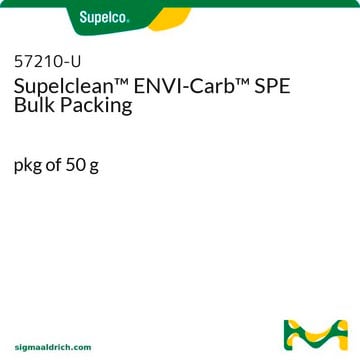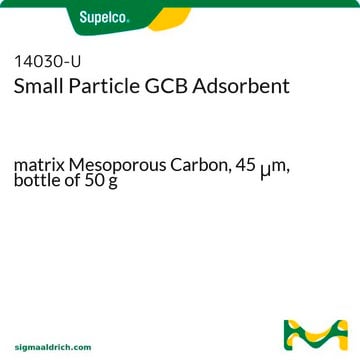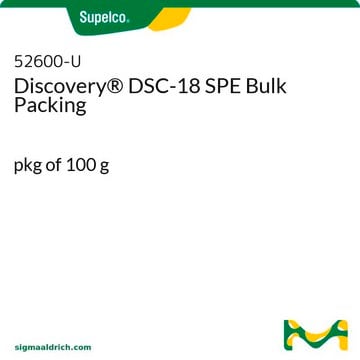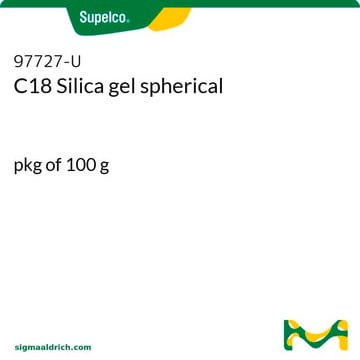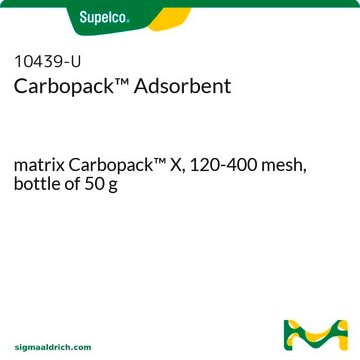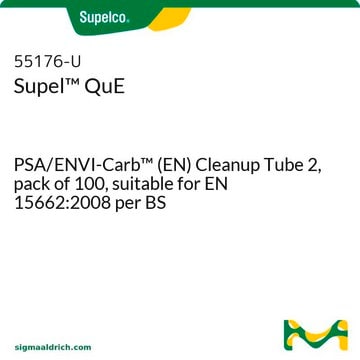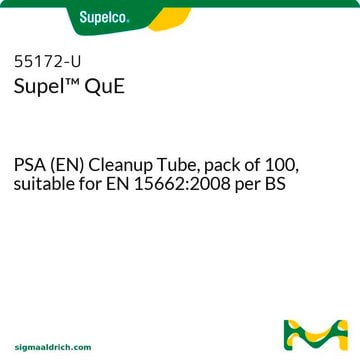14029-U
Small Particle GCB Carbon Adsorbent
matrix Graphitized Carbon, 70000 mesh, bottle of 50g
Sign Into View Organizational & Contract Pricing
All Photos(1)
About This Item
Recommended Products
product name
Small Particle GCB Adsorbent, matrix Graphitized Carbon, <200 nm, bottle of 50 g
form
granular
Quality Level
packaging
bottle of 50 g
technique(s)
LPLC: suitable
surface area
70 m2/g
matrix
Graphitized Carbon
matrix active group
carbon
particle size
<200 nm
pore size
~0.01 cm3/g microporosity
~0.23 cm3/g mesoporosity
~0 cm3/g macroporosity
~137 Å pore diameter
density
~0.07 g/mL (free fall density)
separation technique
reversed phase
Looking for similar products? Visit Product Comparison Guide
Related Categories
General description
A graphitized carbon black (GCB) can be non-porous or porous. The graphitization process results in a highly pure surface with great adsorption and desorption (if required) properties. Surface interactions depend solely on dispersion (London) forces. These particles are:
Generally, GCB adsorbents offer weaker relative adsorptive strength compared to carbon molecular sieve (CMS) adsorbents, and similar relative adsorptive strength compared to spherical graphitized polymer carbon (SGPC) adsorbents. Our small particle GCB products are a type of GCB adsorbent. They are suitable for use in electrochemical and bioprocessing applications.
For more information about any of our carbon adsorbents, please visit sigma-aldrich.com/carbon
- Granular
- Friable
- Used for molecules with an analyte size relative to C3-C20+ n-alkanes
- Hydrophobic (can be used in high humidity environments)
Generally, GCB adsorbents offer weaker relative adsorptive strength compared to carbon molecular sieve (CMS) adsorbents, and similar relative adsorptive strength compared to spherical graphitized polymer carbon (SGPC) adsorbents. Our small particle GCB products are a type of GCB adsorbent. They are suitable for use in electrochemical and bioprocessing applications.
For more information about any of our carbon adsorbents, please visit sigma-aldrich.com/carbon
Storage Class Code
11 - Combustible Solids
WGK
nwg
Flash Point(F)
Not applicable
Flash Point(C)
Not applicable
Personal Protective Equipment
dust mask type N95 (US), Eyeshields, Gloves
Choose from one of the most recent versions:
Already Own This Product?
Find documentation for the products that you have recently purchased in the Document Library.
Customers Also Viewed
Chemistry & Physics of Carbon.
Science, 134-136 (2007)
Jeongmin Lim et al.
Nanoscale research letters, 8(1), 227-227 (2013-05-16)
This study describes a systematic approach of TiO2/carbon black nanoparticles with respect to the loading amount in order to optimize the catalytic ability of triiodide reduction for dye-sensitized solar cells. In particular, the cell using an optimized TiO2 and carbon
Gas Treating: Absorption Theory and Practice.
Eimer D.
Science, 349-350 (2014)
Evaluation of graphitized carbon black as a selective adsorbent for extracting acidic organic compounds from water.
Corcia D
Journal of Chromatography A, 642 (1), 163-174 (1993)
A Di Corcia et al.
Analytical chemistry, 63(6), 580-585 (1991-03-15)
A general liquid-solid extraction procedure for the isolation of pesticides from groundwater and drinking water for high-performance liquid chromatography (HPLC) is presented. This simple and rapid procedure involved passing a 2-L sample through a 250-mg graphitized carbon black (Carbopack B)
Our team of scientists has experience in all areas of research including Life Science, Material Science, Chemical Synthesis, Chromatography, Analytical and many others.
Contact Technical Service
